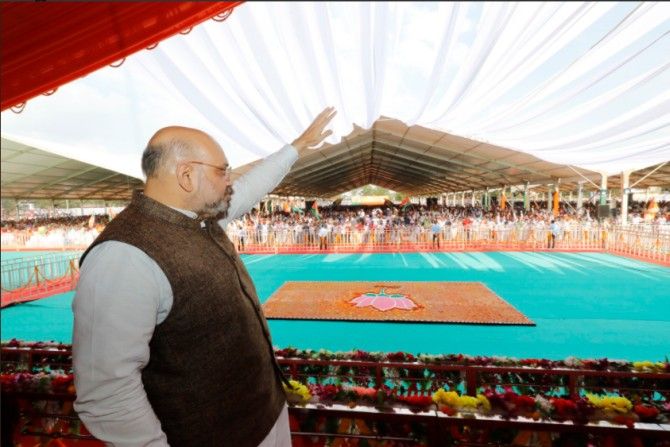Setting aside a popular political dictum that Bastar holds the key to power in the state, the 24 assembly constituencies in Bilaspur division would now decide who will form the next government in Chhattisgarh.
So far the BJP's Amit Shah has held two public meetings and Prime Minister Narendra Modi addressed one in the division in the last one month, reports R Krishna Das.

Recently, a senior district-level office-bearer of the Bharatiya Janata Party received a call from the state unit asking to make arrangement for the night stay of party president Amit Shah in Bilaspur.
The leader could not fathom why Shah was insisting on staying at the divisional headquarters of Bilaspur when state capital Raipur was only 110 km away.
The BJP president was visiting Bilaspur on October 13 to address a booth-level meeting of workers from Sarguja and Bilaspur divisions.
A day later, he met party workers from Raipur, Durg and Bastar.
The meeting was organised in Raipur but instead of returning, Shah preferred to spend more time with party leaders in Bilaspur.
At a five-star hotel, Shah held a marathon meeting for which top leaders from Raipur also drove to take part.
It continued past midnight.
The local unit could now get some sense.
Shah was working on a big plan keeping Bilaspur division at the centre-stage to ensure a fourth successive term for the BJP government in Chhattisgarh.
Bilaspur -- also known as the cultural capital of Chhattisgarh -- would be the focus of the state polls in November.
Setting aside a popular political dictum that Bastar holds the key to power, the 24 assembly constituencies in Bilaspur division would now decide who will form the next government in the state, which has 90 seats.
Shah has held two public meetings and Prime Minister Narendra Modi addressed one in the division in the last one month.
Bahujan Samaj Party supremo Mayawati and Janta Congress Chhattisgarh chief Ajit Jogi, who have reached an alliance, also chose Bilaspur to hold their first public meeting, a day after Shah’s visit.
It signified the division's political significance.
In fact, it is the BSP-JCC alliance that has brought Bilaspur into the election spotlight.
The electoral outcome of 2018 would largely depend on how much the alliance would eat into the Congress's votes, and Bilaspur would be the battle turf.
In the 2013 state polls, the BJP had won 12 seats, while the Congress bagged 11 in Bilaspur.
The BSP got one seat but finished second in two constituencies.
The BSP has a considerable presence in 16 seats across the state where its vote share climbs up to 33 per cent.
Of these, 11 seats are in Bilaspur division.
The BSP-JCC alliance has made the otherwise bipolar contest in the state a triangular fight.
Around 30 constituencies are likely to witness a three-cornered contest in the ensuing state polls.
Of these, the majority are in Bilaspur division.
Eyeing the BSP’s 4.27 per cent vote share in the state, the Congress was desperate to form an alliance and overcome the difference of 0.7 per cent votes that it had with the BJP in the last state election.
Jogi, however, played spoilsport.
While the Congress received a big jolt, the BJP does not have good reasons to smile, though the new political formation appears scoring for it.
“It is not necessary that the BJP will get the benefit of a split in votes,” said political commentator Virendra Pandey.
A section in the BSP has not taken the alliance decision in a healthy way, Pandey said.
The BSP votes going to Jogi appeared bleak, he said, adding that if these votes went against the BJP due to anti-incumbency, the game would change in the Congress’s favour.
The proportion of anti-incumbency and anti-BJP votes that the BSP-JCC alliance bags would be crucial.
“The anti-incumbency after 15 years of rule is natural,” said Chief Minister Raman Singh. But the development that had taken place in the state over the period would help and the party had been showcasing it, he added.
Singh is on a hectic campaign for the last two months, with his “yatras” marketing his government’s feats.
He remains the most popular face of the party, but the BJP is wary of resentment against its sitting legislators and plans to drop most of them to put up new faces in the fray to combat anti-incumbency.
Candidates’ selection would be a major factor.
The Congress also had the bitter taste of anti-incumbency against its legislators.
In 2013, it had fielded all its 36 sitting legislators but 27 of them lost.
While the 2018 electoral battle would be keenly contested, one thing would be common -- the survival of the leaders leading the race.
For Singh, it would be an acknowledgement of his work that would help consolidate his position in the party.
For Jogi, the 2018 polls would be the maiden one under his new political umbrella. The outcome would decide where he stood among the electorate.
The BSP is also looking for a greater political space in Chhattisgarh as its vote share dwindled from 6.12 per cent in 2008 to 4.27 per cent in 2013.
After all, it would help Mayawati to stake a claim as the united opposition’s prime ministerial candidate.











